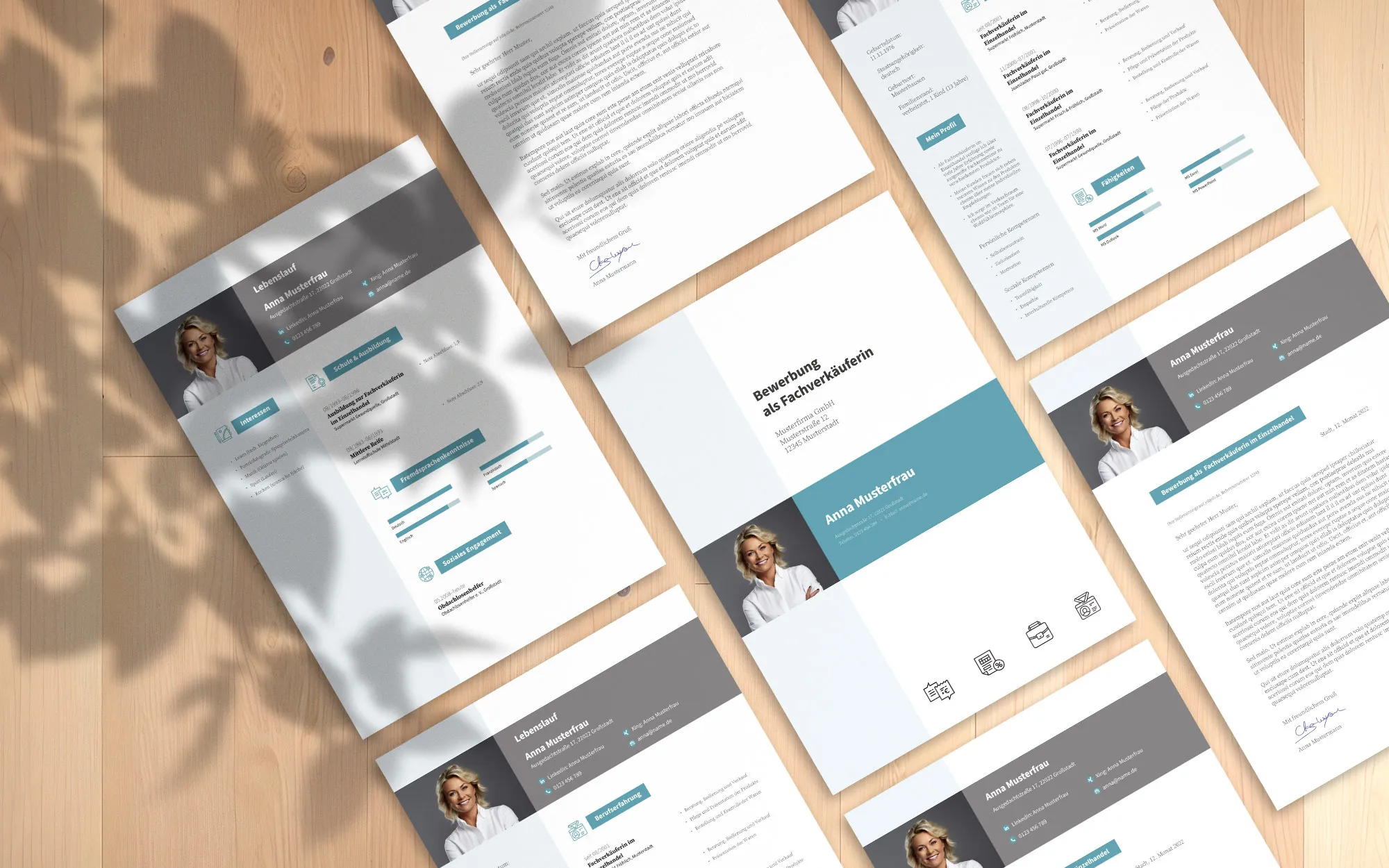Translates to: "Interpreter for the Deaf: Template for a job application with a resume
Imagine yourself sitting as a transcription interpreter in a job interview, being the one who translates the spoken text into writing in real time - you want to approach your own application process with the same precision and professionalism, right? If you are interested in a position as a transcription interpreter and are looking for comprehensive information on the application process as well as tips for your resume, you have come to the right place.
Applying as a Transcription Interpreter: We Have the Templates - and Here Are Tips for Your Cover Letter
You can refer to our sample cover letter for the application as a transcription interpreter. This template will help you formulate your cover letter in this professional field. Make sure to carefully consider the requirements of the specific job offers. Skillfully link your previous skills and experiences with the required knowledge and qualities from the job posting. It is important for the recruiter to recognize that you are both professionally qualified and genuinely interested in the advertised position. This will increase your chances of being invited to an interview.
Dear [Name of Contact Person],
Writing and language are my passions, and it is this very combination that I wish to bring to your team. As a trained transcription interpreter, my drive is to break down barriers and facilitate people's access to important information and cultural offerings.
Throughout my past work experience, I have always been characterized by precision and a high level of responsibility. My ability to quickly and accurately grasp and transfer complex content sets me apart. Even in stressful situations, I remain calm and focused, enabling me to ensure high quality in my work.
Through my previous experiences, I have not only enhanced my technical skills but also developed a deep understanding of the needs of hearing-impaired individuals. Working with modern technologies of speech recognition and transcription is second nature to me.
I look forward to presenting my skills in more detail in a personal conversation and discussing how I can support your team.
Yours sincerely
[Your Name]
Do you like the template? Feel free to use it as a guideline for your application as a transcription interpreter and customize it. Don't forget to add your personal information and the complete recipient, as well as the date. If you know a contact person, it is always better to address them directly with: Dear Mr. Schmidt.

Make It Personal: Tailor the Sample Text for Your Cover Letter to Your Specific Situation
Be sure to customize the provided cover letter template to reflect your unique experiences and skills as a transcription interpreter authentically. This not only demonstrates your dedication but also helps you stand out from other applicants.
- Live Transcription: Simultaneously transcribing and translating spoken words into written form.
- Preparation: Thorough research and preparation to familiarize oneself with specific technical terms and topics.
- Post-Event Transcription: Creating written versions of presentations or discussions after their completion.
- Communication Facilitation: Assisting hearing-impaired individuals in participating in conversations and events.
- Quality Assurance: Regularly reviewing and correcting transcriptions to ensure the highest accuracy.
If you adapt the template well to your personal experiences and consider the listed activities in the profession of transcription interpreter, you will be well-prepared to make a positive impression on your future employer.

Discover Where Your Skills as a Transcription Interpreter Are in Demand
As a transcription interpreter, you can work in many different industries. This professional skill is versatile and increasingly important, especially in a more diverse and inclusive society. Here, we want to introduce you to some of the most important industries where your competencies are needed.
- Education Sector: Speech-to-text interpreters assist hearing-impaired students and scholars by transcribing lectures, seminars, and classes live.
- Legal System: In court proceedings and hearings, speech-to-text interpreters help people with hearing impairments follow the process.
- Healthcare: In medical practices and hospitals, speech-to-text interpreters facilitate communication between doctors and patients with hearing impairments.
- Companies and Organizations: During company meetings, conferences, and trainings, speech-to-text interpreters ensure equal participation for all employees.
- Cultural Events: At lectures, theatrical performances, and concerts, they enable hearing-impaired audience members to follow the events.
As you can see, many industries offer exciting opportunities for speech-to-text interpreters. This position is not only versatile but also crucial for inclusion and equal opportunities. The areas of application are diverse, ranging from education and law to healthcare and the corporate world. Therefore, it is worth taking a closer look at this career.

Prepare your resume for a successful application as a speech-to-text interpreter
A successful resume for the position of speech-to-text interpreter should convincingly convey both your skills and your previous experiences. You want to stand out from other applicants while showcasing your professional interest and dedication in the field of speech-to-text interpreting.
- Language Proficiency: Provide detailed information on the languages you speak and your proficiency in each.
- Experience in Written Language: Emphasize experiences you have gained in interpreting or related fields, including transcription.
- Technical Skills: Describe your proficiency in using word processing programs and specialized software relevant to the profession.
- Customer Satisfaction and Service Orientation: Optionally mention customer feedback and proofs that demonstrate your professionalism and reliability.
- Further Education and Certificates: Present all relevant training courses and certificates that support your suitability for the profession.
- Multitasking Skills: Demonstrate your ability to handle multiple tasks simultaneously and under pressure.
Overall, your resume should clearly and concisely present the competencies and professional experiences that are crucial for the role of a speech-to-text interpreter. By emphasizing your language skills, technical abilities, and previous work experiences, you can sharpen your profile and convince potential employers of your suitability.
You no longer have to worry about the design, layout, and structure of your application as a speech-to-text interpreter. Easily use our templates, which you can also customize in Word:
